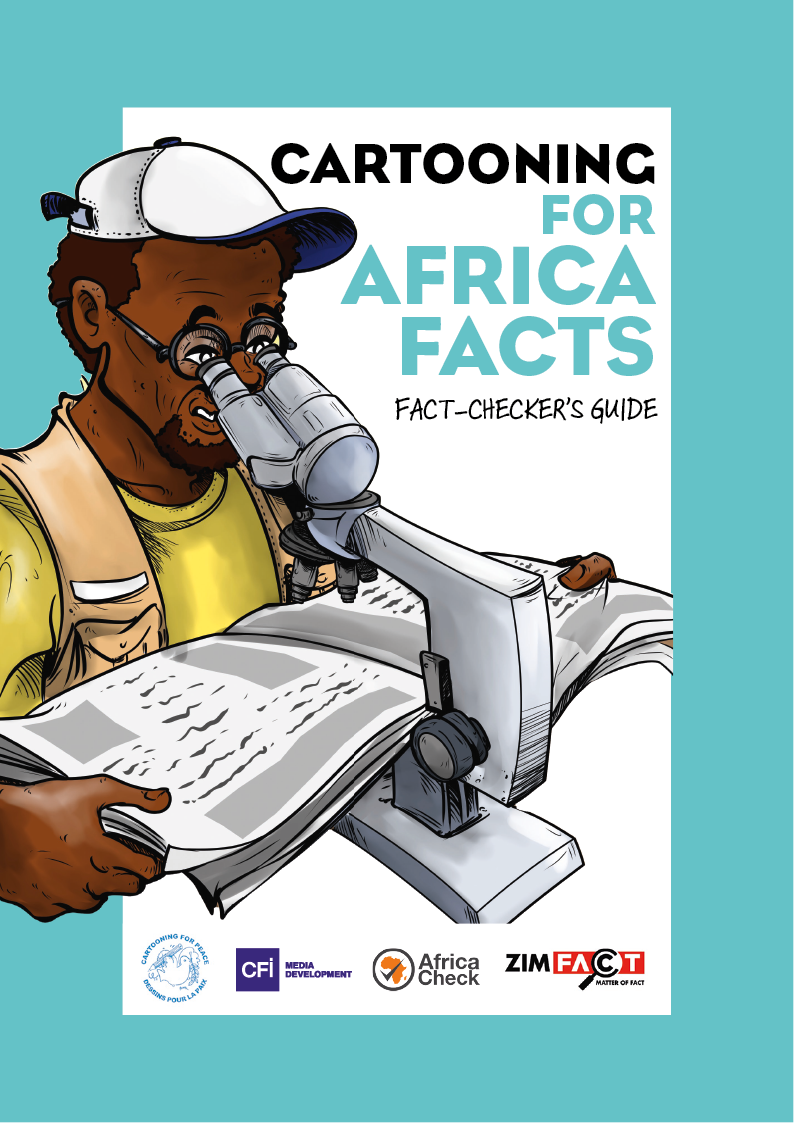
Within this project, a Fact-checker’s Guide is published with:
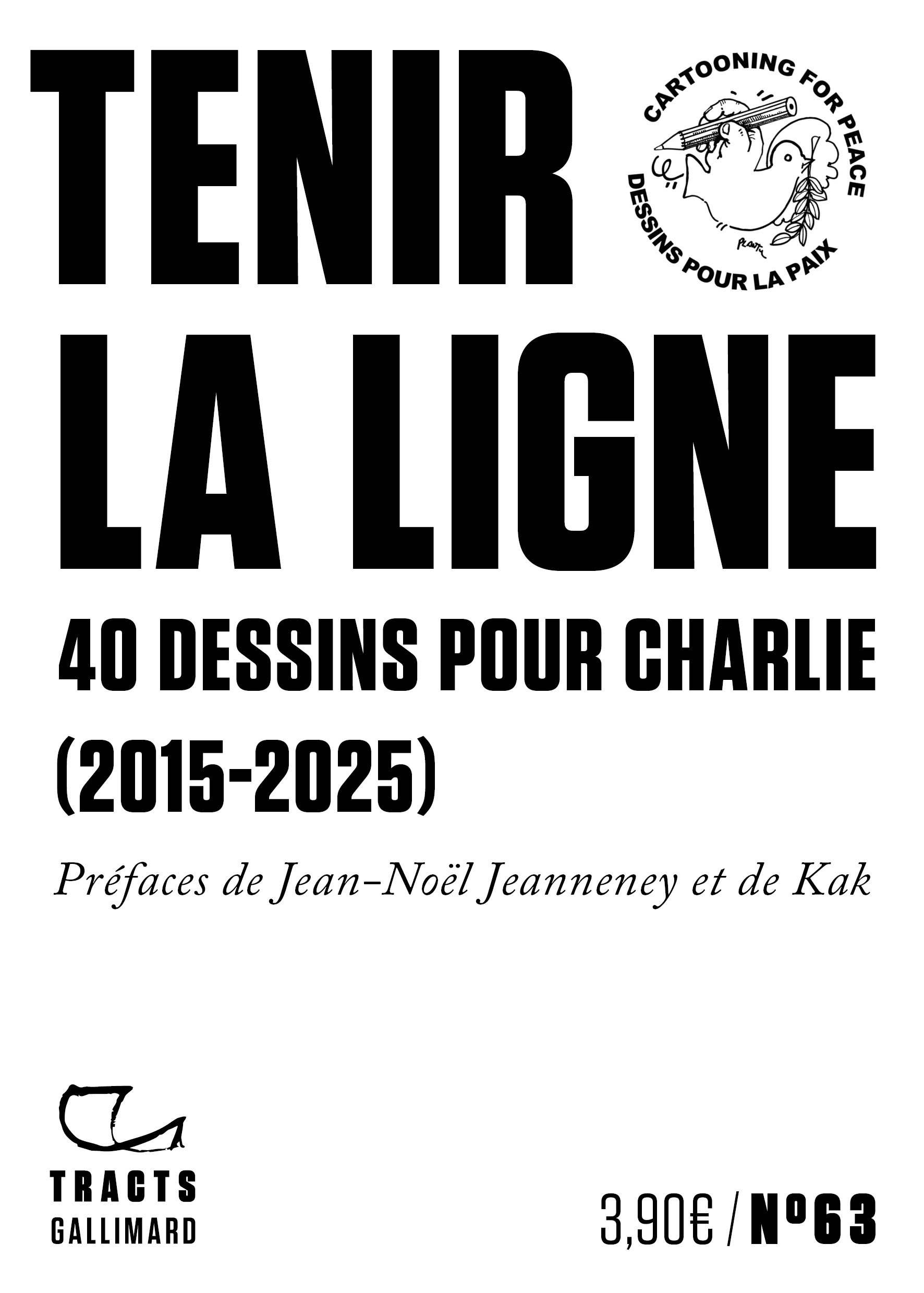
“Are we still Charlie? Ten years after the Charlie Hebdo and Hypercasher massacres, are we still taking to the streets to defend the right to satire, humour and, more broadly, our freedom of expression and the rejection of all forms of violence? While France prepares for this examination of conscience around the commemorations of 7 January 2015, we can already say that elsewhere in the world, the trend is not very Charlie. Since 2024, the majority of the world’s population has been living in a country that censors press cartoons, whether partially or totally. We therefore have a duty, because we are practically the last ones standing, to brandish the banner of the right to satire and freedom of the press.” Kak, President of Cartooning for Peace.
Foreword by Jean-Noël Jeanneney, historian, and by Kak, President of Cartooning for Peace.
Cartooning for Peace is bringing together 40 press cartoons from around the world in this new collection, in tribute to Charlie Hebdo, press cartoons and the fight for freedom of expression.
With cartoons by: Dilem (Algeria); Landschulz (Germany); Langer (Argentina); Cost, Kroll, Lectrr, Marec, Vadot (Belgium); Glez (Burkina Faso); Bado, Côté (Canada); Ramsés (Cuba); Bo Bojesen, Refn (Denmark); Sherif Arafa (Egypt); Kap (Spain); Kuper (United States) ; Jiho, Kak, Mykaïa, Piet, Plantu, Rodho, Sanaga, Willem (France); Behrang Jeddi, Mana Neyestani (Iran); Kichka, Uri Fink (Israel); Nardi (Italy); Emad Hajjaj (Jordan); Boligán, Darío (Mexico); Arend van Dam (Netherlands); António, Carrilho (Portugal); Chappatte, Debuhme, Herrmann (Switzerland).
Published in tribute to the victims of the attacks on 7 January 2015.
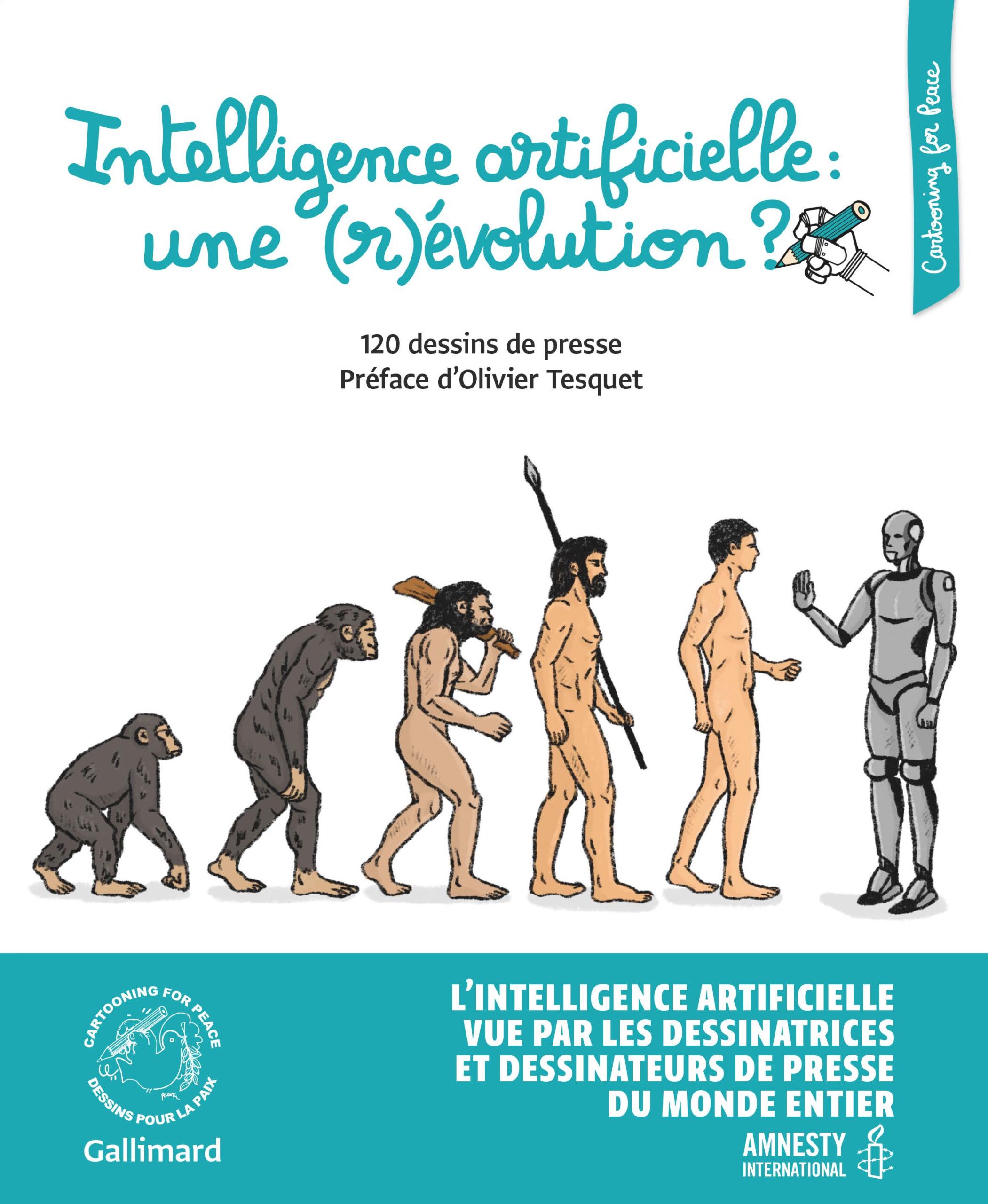
120 international press cartoons look back at the challenges of artificial intelligence.
The spectacular success of ChatGPT, the conversational robot, launched at the end of 2022, has introduced the general public to a sample of the possibilities offered by artificial intelligence (AI): for better or for worse? Awareness of the need to establish a framework for the development of AI seems to be growing in recent times. This technological advance also raises vast ethical, legal, political and economic questions… human questions, in short, as it disrupts every sphere of our lives.
For this book, 120 press cartoons from around the world have been selected by Cartooning for Peace to capture the issues at the heart of the deployment of artificial intelligence, always with humour and… intelligence!
Olivier Tesquet, journalist at Télérama and a specialist in digital surveillance, is the foreword.
An exhibition “Artificial intelligence: a (r)evolution?” has been created and is available.
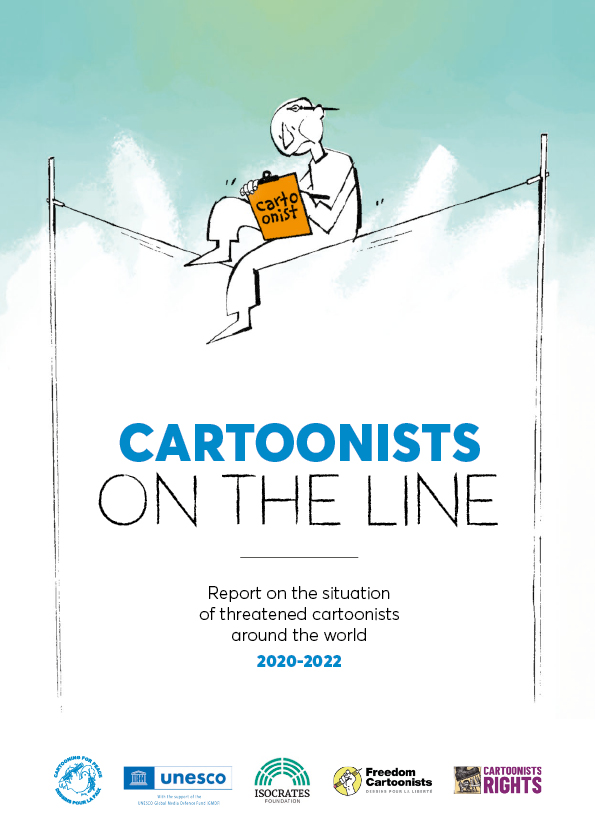
Given the convergence of their missions and their constant efforts to help cartoonists, Cartooning for Peace and Cartoonists Rights have joined forces to produce this report, which presents the main challenges facing cartoonists in terms of freedom of expression that their monitoring and support work has enabled them to identify.
Although not exhaustive, this report is based on analyses and case studies from the period 2020-2022. It highlights the increase in State censorship in authoritarian regimes, the rise in online violence and hatred towards press cartoonists and their ever-increasing and disproportionate criminalisation, not to mention the difficult situation of exile that recent conflicts have exacerbated. Based on these observations, the report sets out recommendations for the protection of cartoonists.
Produced as part of the project “Enhancing legal support to press cartoonists in the digital age (2022-2024)” implemented by Cartooning for Peace and supported by UNESCO’s Global Media Freedom Fund (GMDF) and the Isocrates Foundation, this work, enriched by numerous contributions, has also benefited from the support of the Freedom Cartoonists Foundation and the World Forum for Democracy.
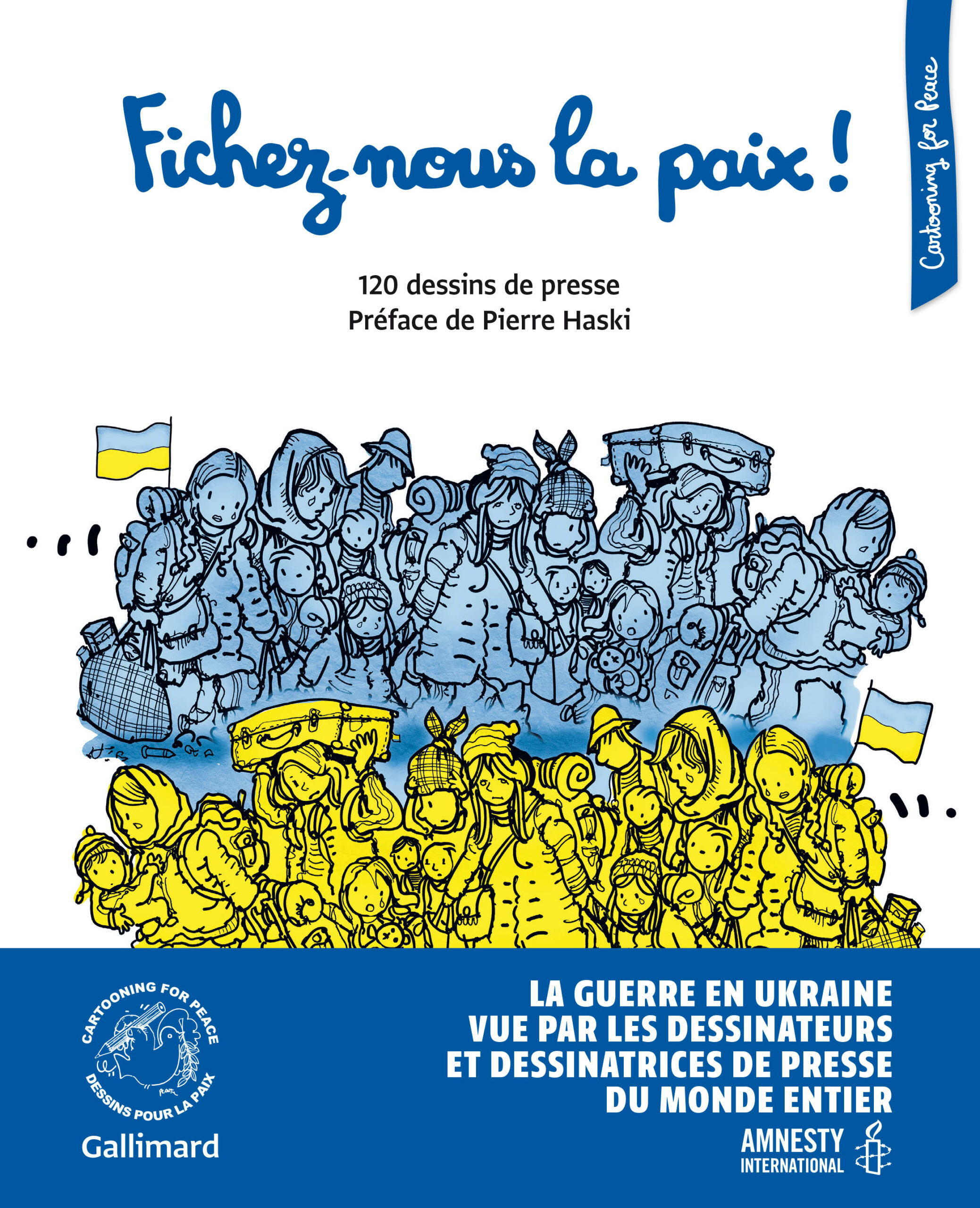
120 international press cartoons look back at the war in Ukraine, its stakes and its consequences.
On 24 February 2022, Russia invaded Ukraine. This war on European soil has claimed thousands of victims and takes us back to the darkest hours of history. While this conflict is reminiscent in many ways of the wars of the last century, it also raises other issues and new threats: nuclear, economic, energy, information warfare, etc.
Since the beginning of the confrontations, the association Cartooning for Peace has gathered hundreds of press cartoons that alert us and denounce the situation.
For this book, with a preface by journalist Pierre Haski and in partnership with Amnesty International and France Médias Monde, 120 striking drawings have been selected. Coming from all over the world, they allow us to grasp the stakes of this war with heavy consequences, whether human, political or economic.
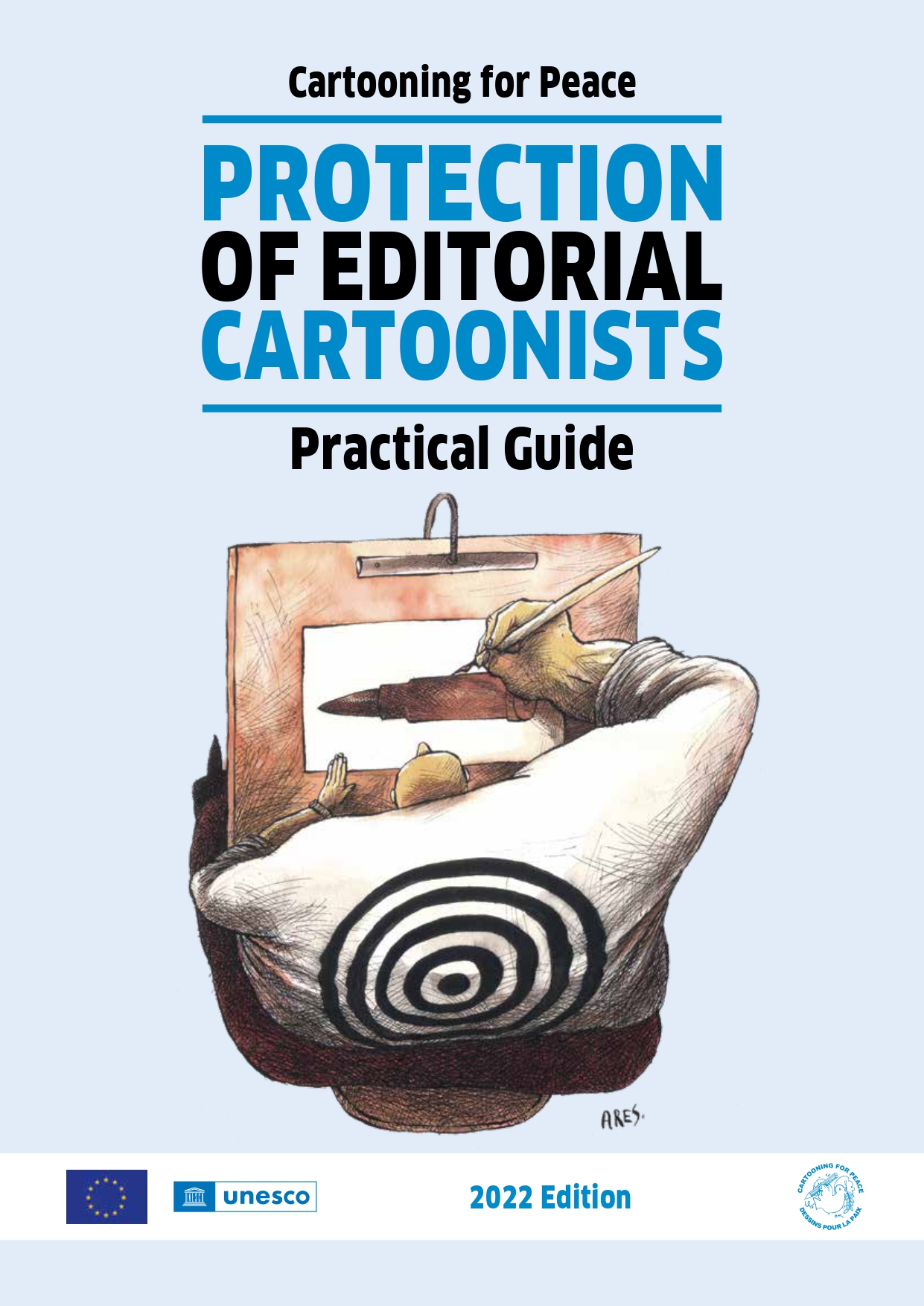
The 15-month project “Support to the legal protection of press cartoonists (2021-2022)” which received financial support from the Global Media Defence Fund (GMDF) managed by UNESCO, had the main objective to improve the legal protection of editorial cartoonists and thus contribute to an environment of free, plural and quality information for citizens.
In its framework, Cartooning for Peace published a revised version of the Protection of editorial cartoonists practical Guide, its first edition dated from 2019.
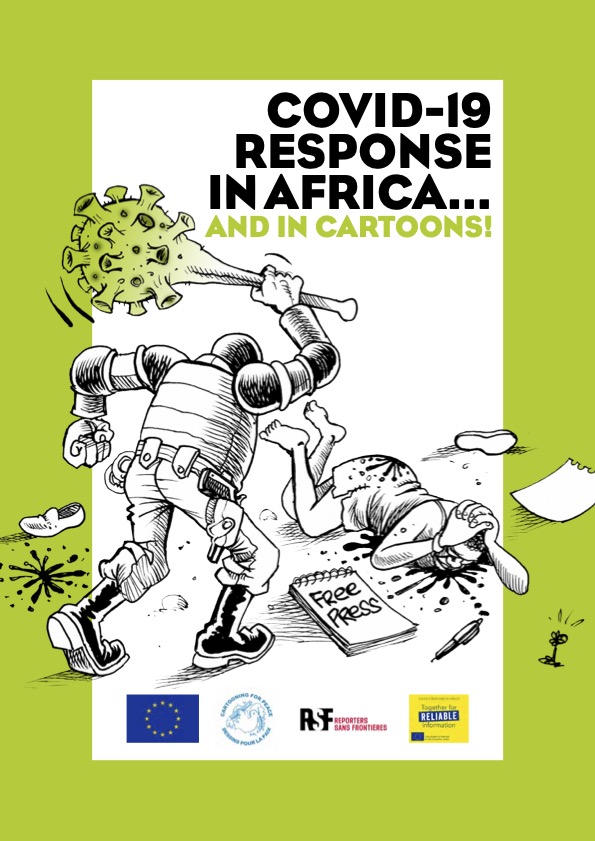
COVID-19 Response in Africa: Together for Reliable Information
ARTICLE 19, Deutsche Welle Akademie, Fondation Hirondelle, Free Press Unlimited, International Media Support, Reporters Without Borders and UNESCO have joined forces in a project called “COVID-19 Response in Africa: Together for Reliable Information”, funded by the European Commission’s Directorate-General for International Cooperation and Development (DG DEVCO).
Led by Free Press Unlimited, the consortium has been implementing this 18-month project since 1 August 2020. The aim of the project is to facilitate the dissemination of reliable, critical information about coronavirus – currently inaccessible to at-risk populations, as the operations of a number of independent media outlets in Sub-Saharan countries are being hampered by the pandemic.
To achieve this, the project is providing support to media stakeholders in Sub-Saharan Africa, who have been left with few income-generating options since the arrival of COVID-19. Many of the activities undertaken are giving these media stakeholders time to adapt and survive the crisis caused by COVID-19, whilst at the same time helping them to provide their public with relevant, vital information about the pandemic.
In partnership with Reporters Without Borders, Cartooning for Peace took part in the programme in order to support and recall the essential role of the continent’s press cartoonists. This publication is the result of this partnership and allows us to look back, through cartoons, at all these major issues for press freedom.
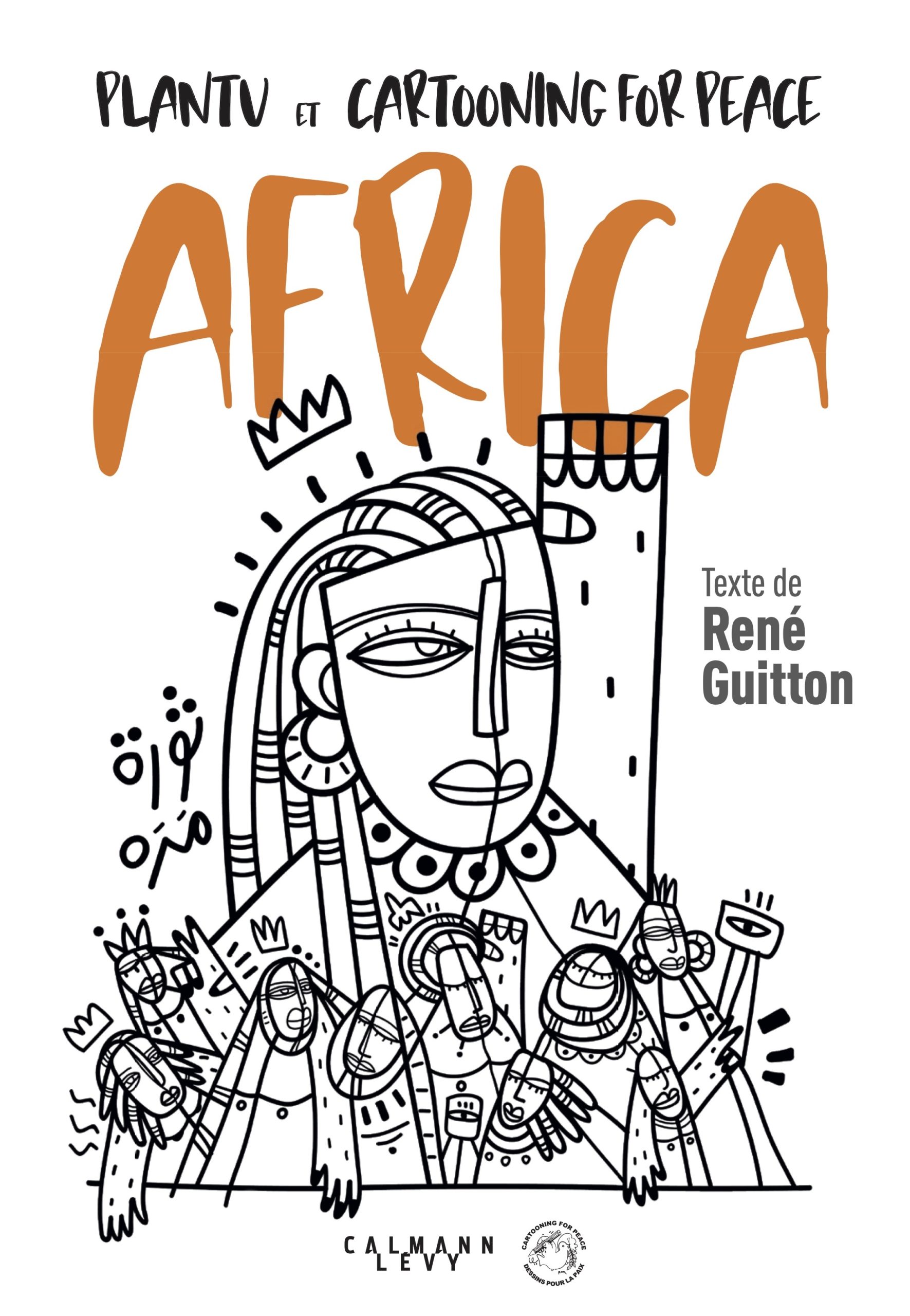
A unique collection of the greatest African press cartoons
Text by René GUITTON
Preface by Audrey AZOULAY
This book is an event that brings together the greatest press cartoonists from all over the African continent who are fighting in their respective countries for the fundamental right of press freedom. Plantu and Cartooning for Peace have brought together a selection of their most striking cartoons, which together constitute a unique collection. Some fifty cartoonists, including Zapiro (South Africa), Gado (Kenya), Glez (Burkina Faso), Dilem (Algeria), Alaa Satir (Sudan), Sherif Arafa (Egypt), Zohoré (Ivory Coast) and Willis from Tunis (Tunisia) represent some twenty countries. Some of them began their work in often difficult conditions. Others have come to the world. What they all have in common is that they have understood that drawing is the ideal weapon for writing about their society and criticising its ills, despite the intimidation and, in some cases, imprisonment to which they are subjected.
Africa has always been a land of palaver and dialogue between joking cousins who know how to take mockery and self-criticism to extremes. These drawings form the markers of contemporary African history. But these artists do not hesitate to aim some of their arrows at the world. They see us as much as we see them, and their vision of strength, relevance and truth, responds to a single watchword that is repeated from drawing board to newsroom: “Cartooning for Freedom”.
In bookshop the 12th of May
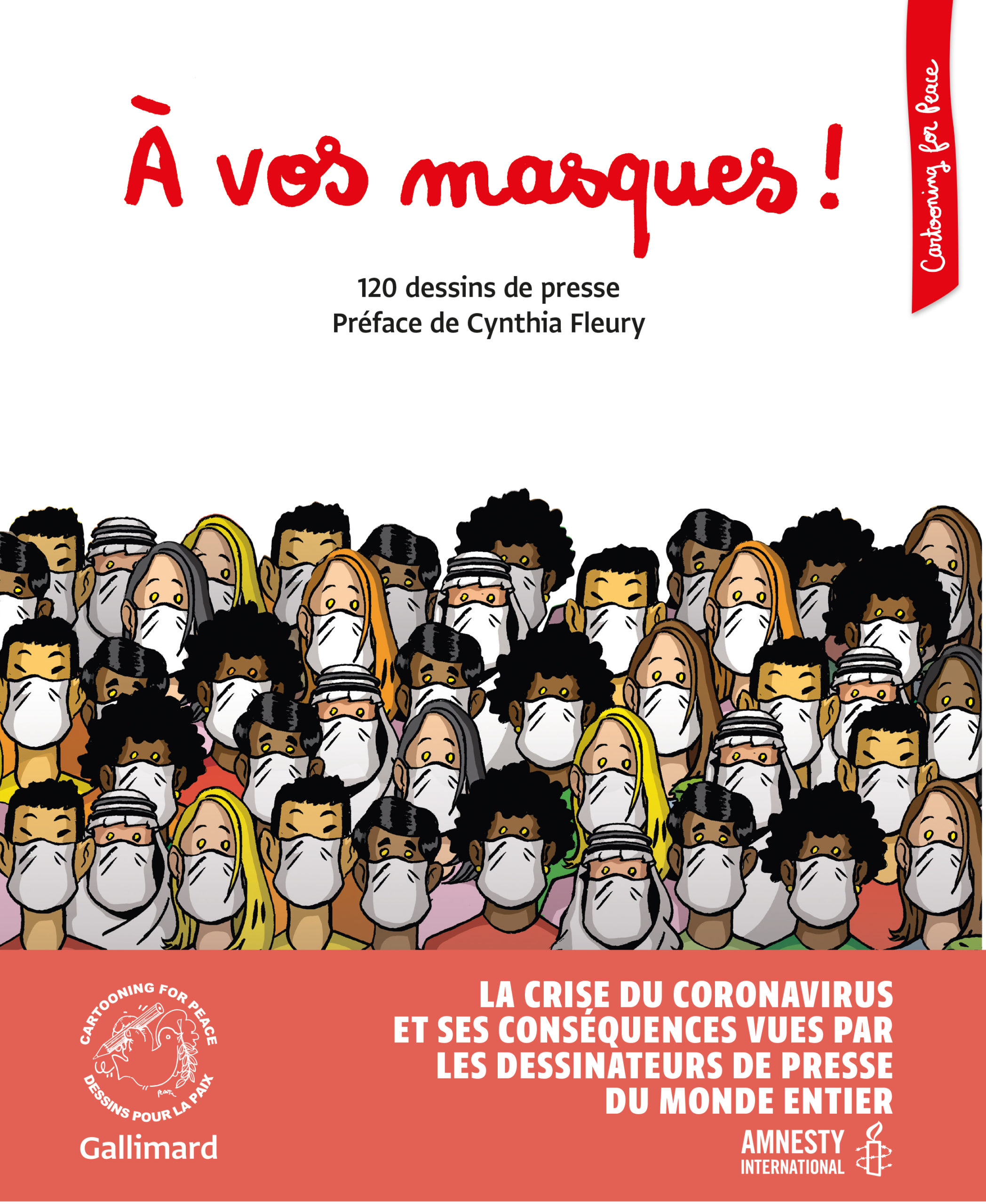
120 international press cartoons look back on the coronavirus crisis and alert us to the world of tomorrow.
In recent months, the spread of the Covid-19 disease has led to the containment of more than half of the planet, radically changing our daily lives.
Since the beginning of this unprecedented crisis, the association Cartooning for Peace, whose network of cartoonists extends to 67 countries on all continents, has collected hundreds of press cartoons every day that report on the international situation.
For this book with a preface by Cynthia Fleury, the 120 most striking cartoons were selected. Coming from all over the world, they help to understand the stakes related to coronavirus, a health challenge whose political and economic consequences are already very important.
Among the themes addressed: a global pandemic, health under test, a confined life, politics in the face of the health crisis, a major economic impact, the planet is breathing, the post-Covid-19 era…
Cynthia Fleury, philosopher and psychoanalyst, is Professor of “Humanities and Health” at the Conservatoire National des Arts et Métiers. Holder of the Chair of Philosophy at the GHU Paris Hospital “Psychiatry and Neurosciences”.
In partnership with Amnesty International.

120 international press cartoons highlight women’s struggle for equal rights from #MeToo and denounce violence against women around the world, preface by Laure Adler in partnership with Amnesty International.
In 2017, the #MeToo movement called for the liberation of the voice of victims of sexual harassment. Millions of women around the world spoke with one voice to bear witness to the abuse they may have suffered. Today, what conclusions can we draw from this episode? If our society seems to be engaged in a necessary reflection on the status of women, with equality between women and men as its horizon, respect for the rights of each woman is still far from being guaranteed in France and in the four corners of the globe. Selected by Cartooning for Peace, 120 international press cartoons come back to women’s rights in the world after #MeToo. While participating in the denunciation of injunctions and violence against women, they support feminist struggles and their determining issues.
Out on the 5th of March
An exhibition “Cartooning for Women” has been created and is available.
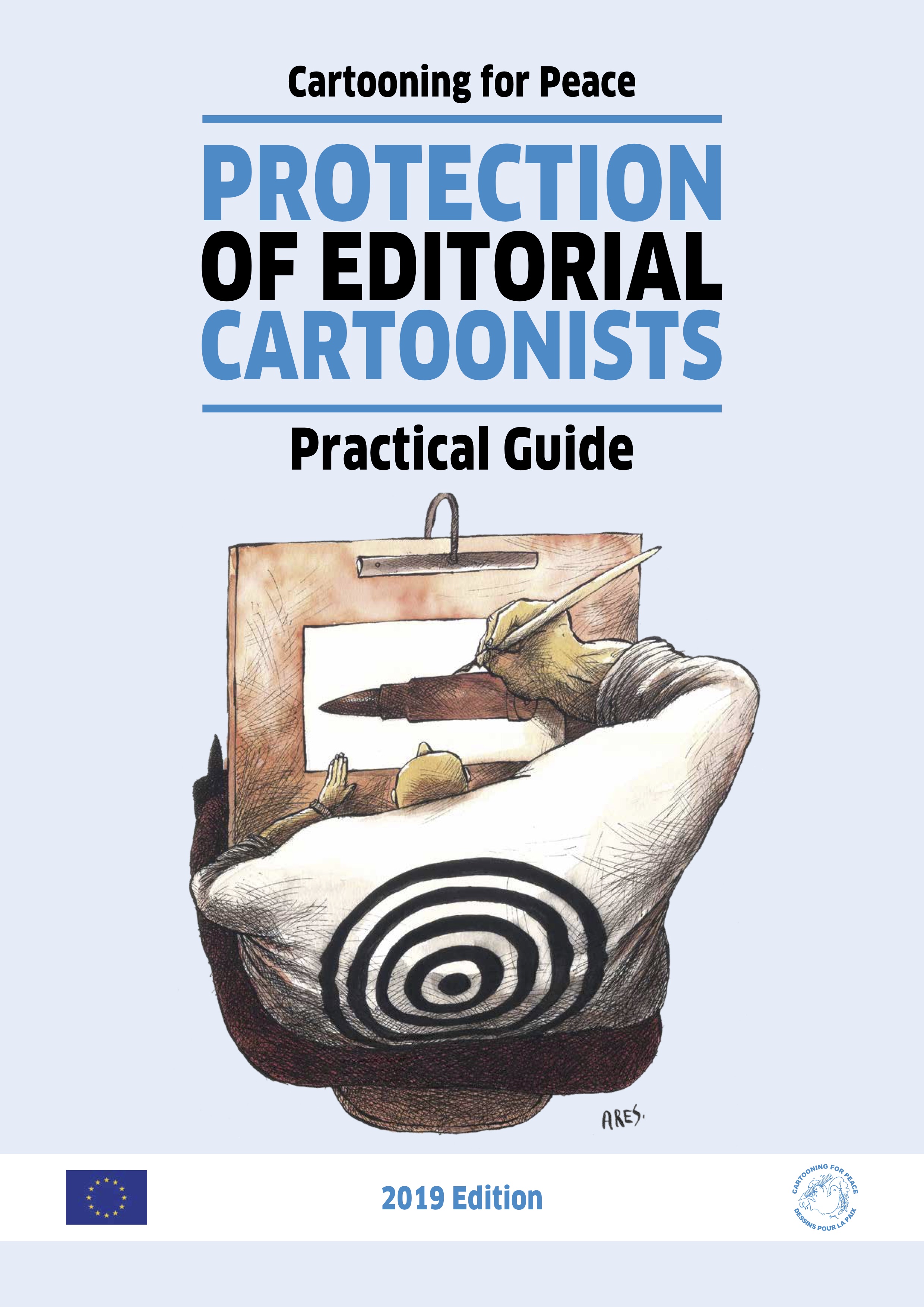
Produced with the support of the European Union, designed for cartoonists and available on the Cartooning for Peace website, this document brings together advice and information that can guide those who face specific or persistent threats because of their profession. With tips, testimonies and useful links, it focuses as much on risk prevention as on the response to threats and attacks.
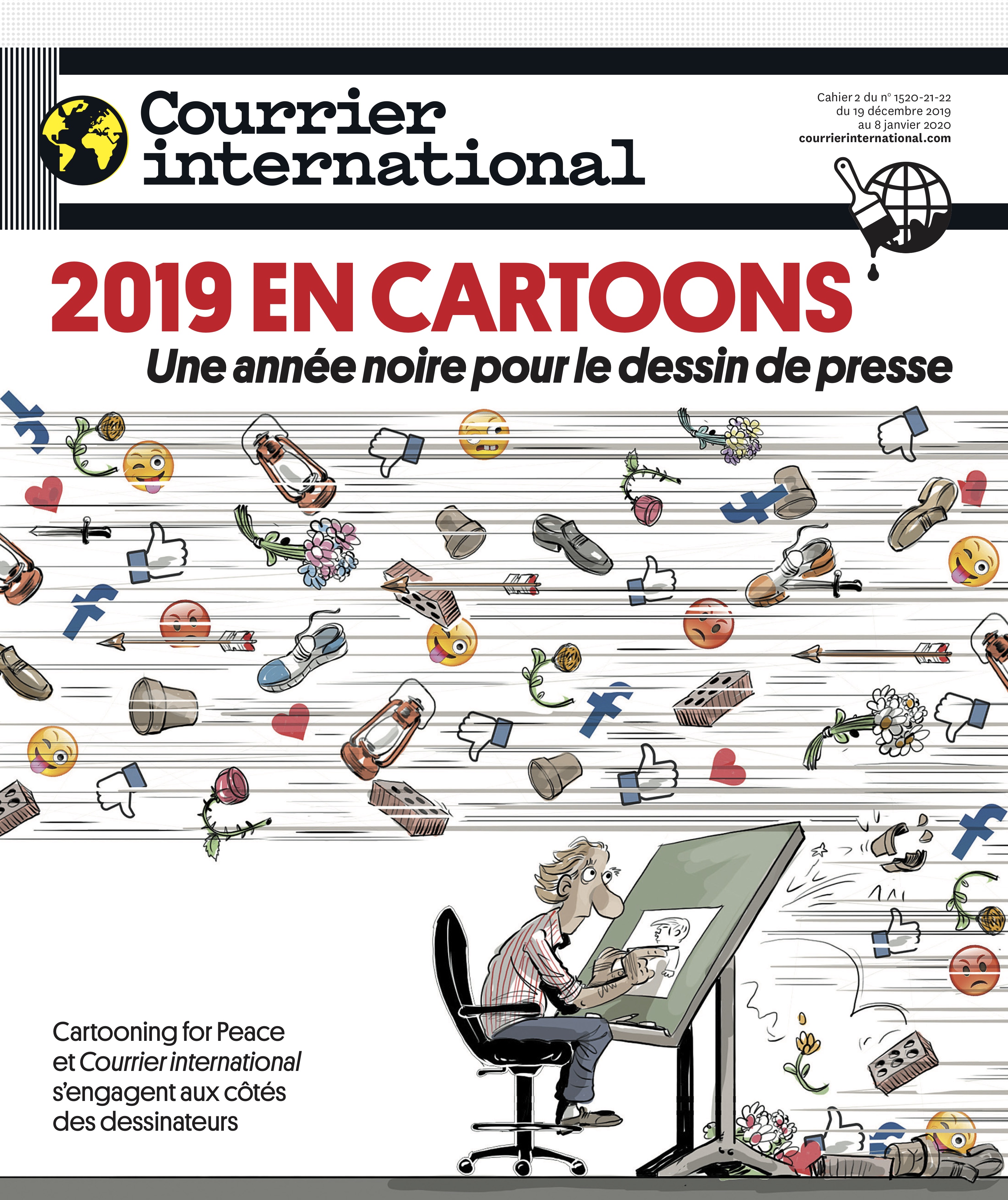
Courrier International, in the issue “2019 en Cartoons” to be published on December 19, publishes a special report produced with Cartooning for Peace in French. Integrated into the annual review of the year’s news in press cartoons from around the world, the dossier will raise readers’ awareness of the situation of the profession today and the challenges that some press cartoonists may have faced in carrying out their mission in 2019.
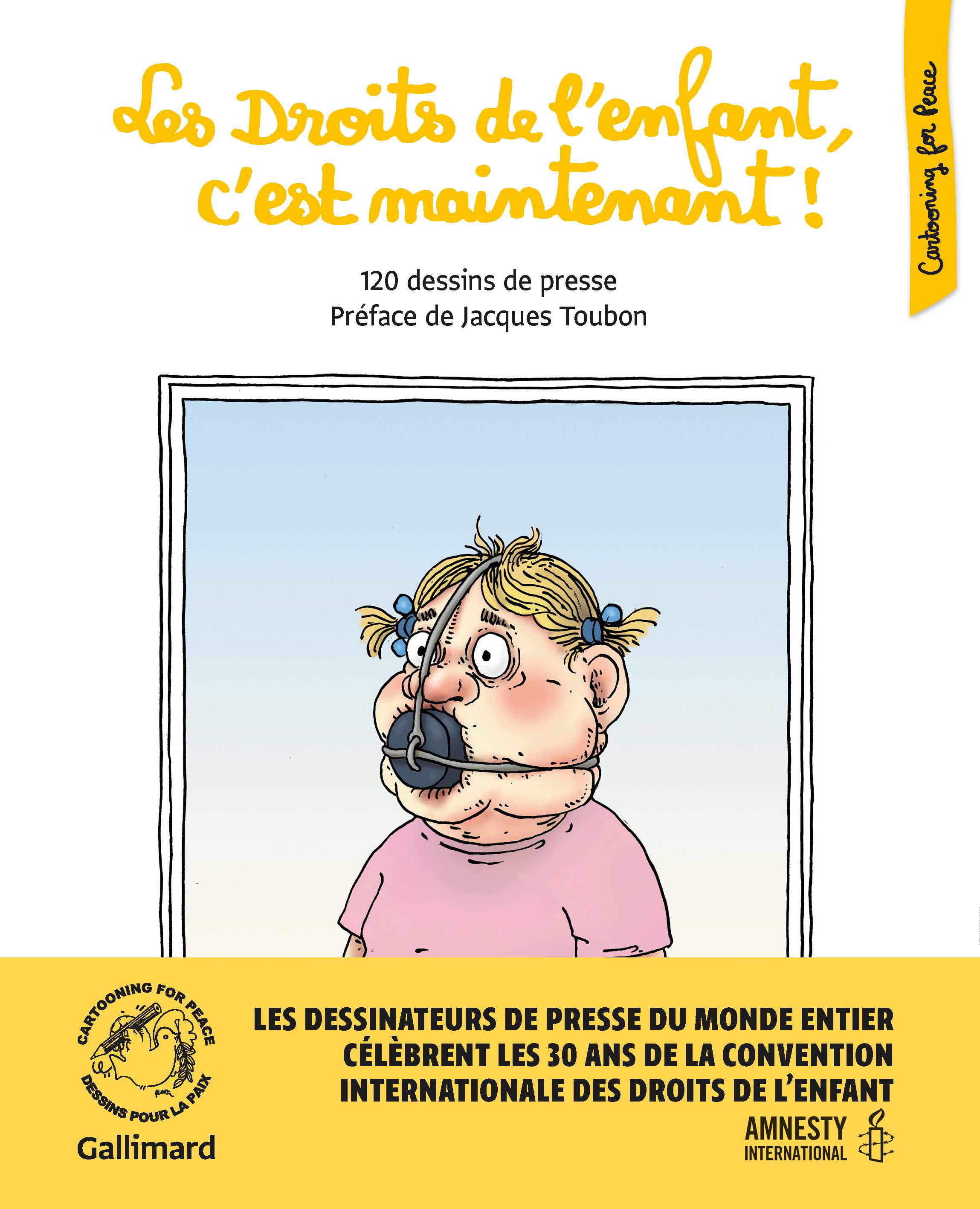
30 years after the adoption of the Convention on the Rights of the Child, press cartoonists around the world are defending the justice and freedom of the youngest.
In November 1989, the United Nations adopted the Convention on the Rights of the Child, which recognizes children as human beings in their own right, with fundamental, compulsory and non-negotiable rights: the right to be cared for, to go to school, to be fed, to be protected from all forms of abuse and exploitation, not to wage war, nor to suffer it… The consensus is unprecedented, it is the most widely and rapidly ratified human rights treaty in history!
Yet 30 years later, what about the rights of the child? Taking part in the tireless fight for justice and freedom, press cartoonists denounce violations of children’s rights, whether in Syria, Nigeria, China, Gaza or France. This book contains 120 press cartoons from all over the world, in partnership with Amnesty International, with a preface by Jacques Toubon, Human Rights Defender.
Royalties are donated to Cartooning for Peace to support threatened cartoonists.
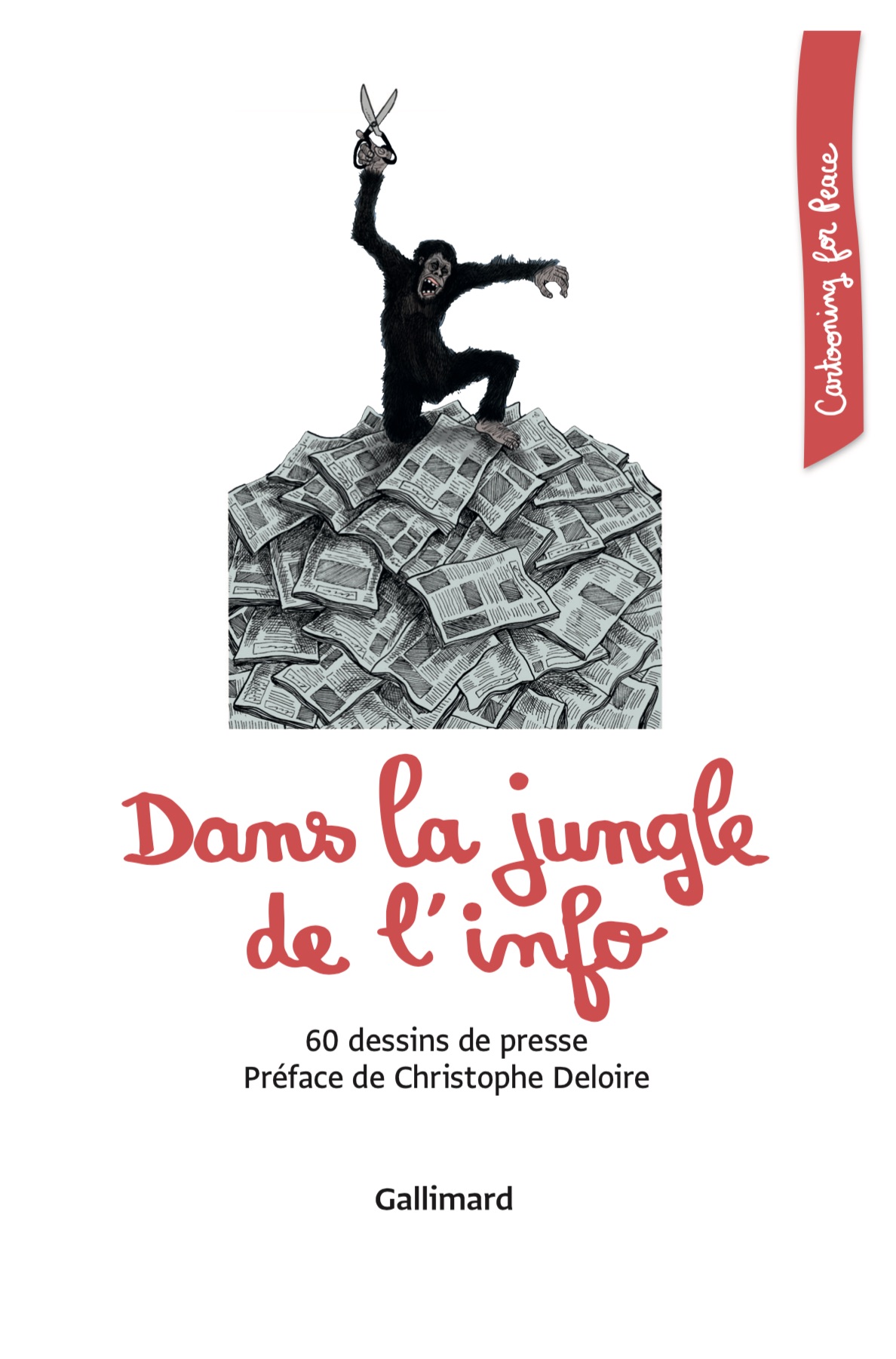
An inventory of the media and information situation today.
In an era of fake news, information piracy, the influence of social networks, conspiracy theories, and the preponderance of marketing over editorials, Christophe Deloire (Secretary General of Reporters Without Borders) reiterates the urgent need to preserve free, independent, reliable, verified and plural information.
The preface to this book is written by Christophe Deloire, Secretary General of Reporters Without Borders (RSF) since 2012. In November 2018, he initiated the International Declaration on Information and Democracy. He was Director of the Journalists’ Training Centre from 2008 to 2012. He also worked for Le Point magazine from 1998 to 2007, and for the television channels Arte and TF1.
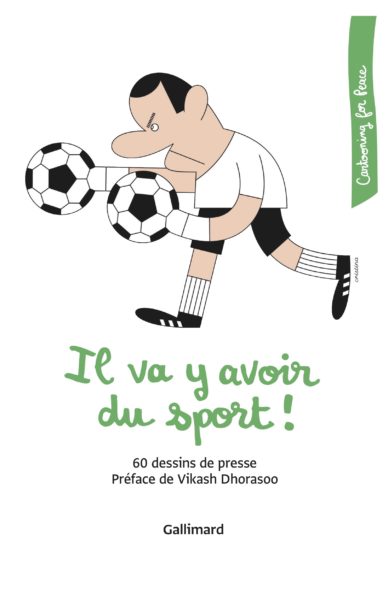
A drawn overview of the sports planet.
Sport is a unifying element, a vector of social cohesion and living together. While major events are capable of bringing citizens and nations together, the sports world is regularly marred by various scandals: doping, racism, corruption, etc. But are the failings of sport sport sport?”, asks committed footballer Vikash Dhorasoo.
Vikash Dhorasoo is a former international footballer. Selected for the French team for the 2006 World Cup, he filmed his daily life as a player and made a documentary, Substitute. He is now a football consultant for radio and television. He recently published his autobiography, Comme ses pieds (Seuil, 2017). He is also co-founder of the Tatane association, which defends “a sustainable and joyful football”, and ambassador of Oxfam France.
Royalties are donated to Cartooning for Peace to support threatened press cartoonists.
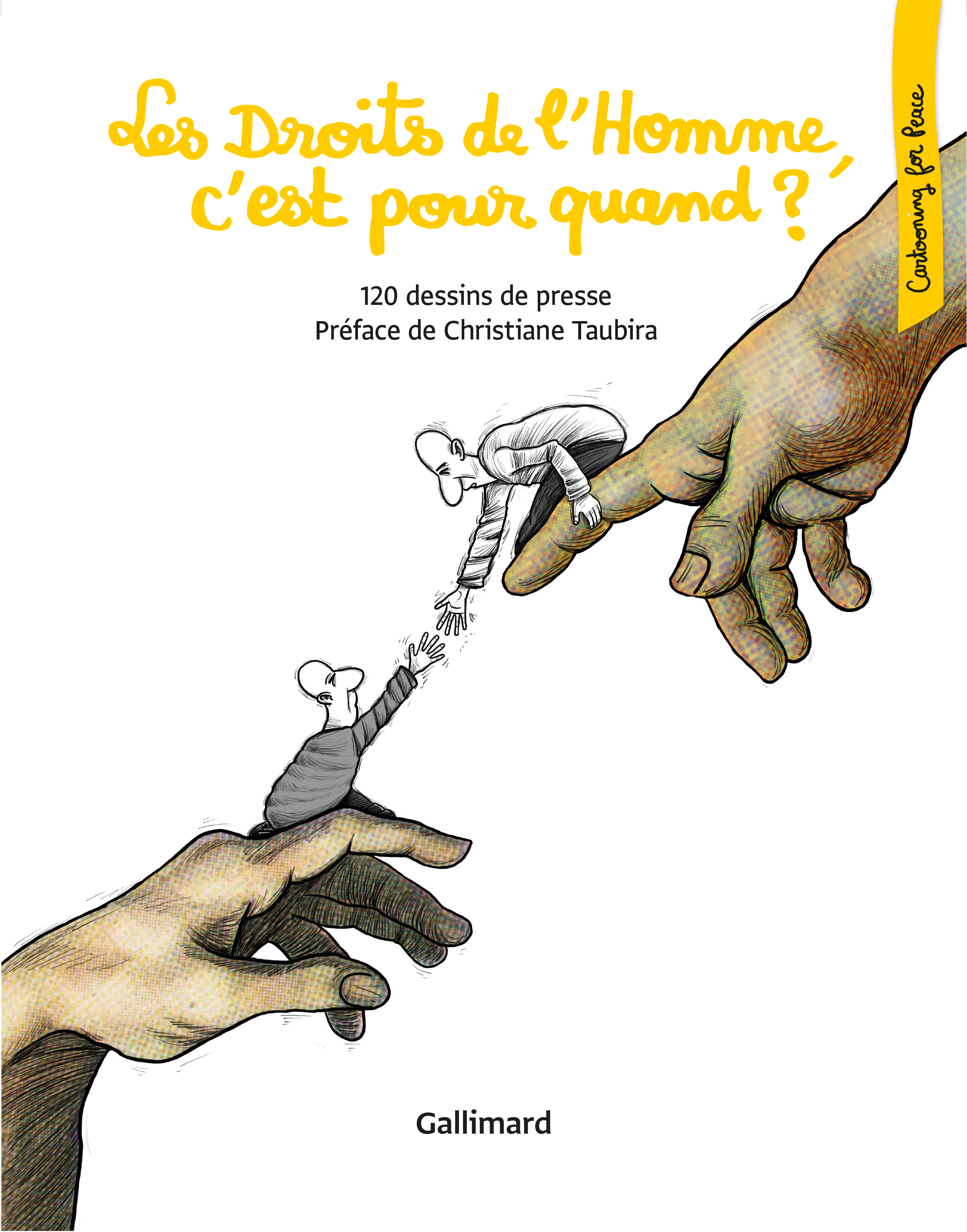

An overview in cartoons of contemporary sexuality
At a time when the voices of victims of sexual harassment are being heard after the Weinstein case, cartoonists are accompanying this shift in consciousness by questioning what sexuality is about today. A selection of 60 press cartoons from all over the world explore the concepts of taboos and pleasures, but also love and, sometimes, violence. The preface is signed by Maryse Wolinski, journalist and writer. Engaged in the feminist revolution, she is the author of several stories and novels.
Royalties are donated to Cartooning for Peace to support threatened cartoonists.

Press cartoonists around the world denounce socio-economic injustices
While the number of people living below the global poverty line has declined significantly in recent years, the gap between the living standards of the poorest and the wealthiest continues to widen. Cartoonists alert us to this phenomenon and invite us, through a selection of 60 drawings from the international press, to a collective awareness of the economic and social inequalities of our time. The preface is written by Thomas Piketty, an internationally renowned economist and author of several successful books.
Royalties are donated to Cartooning for Peace to support threatened cartoonists.
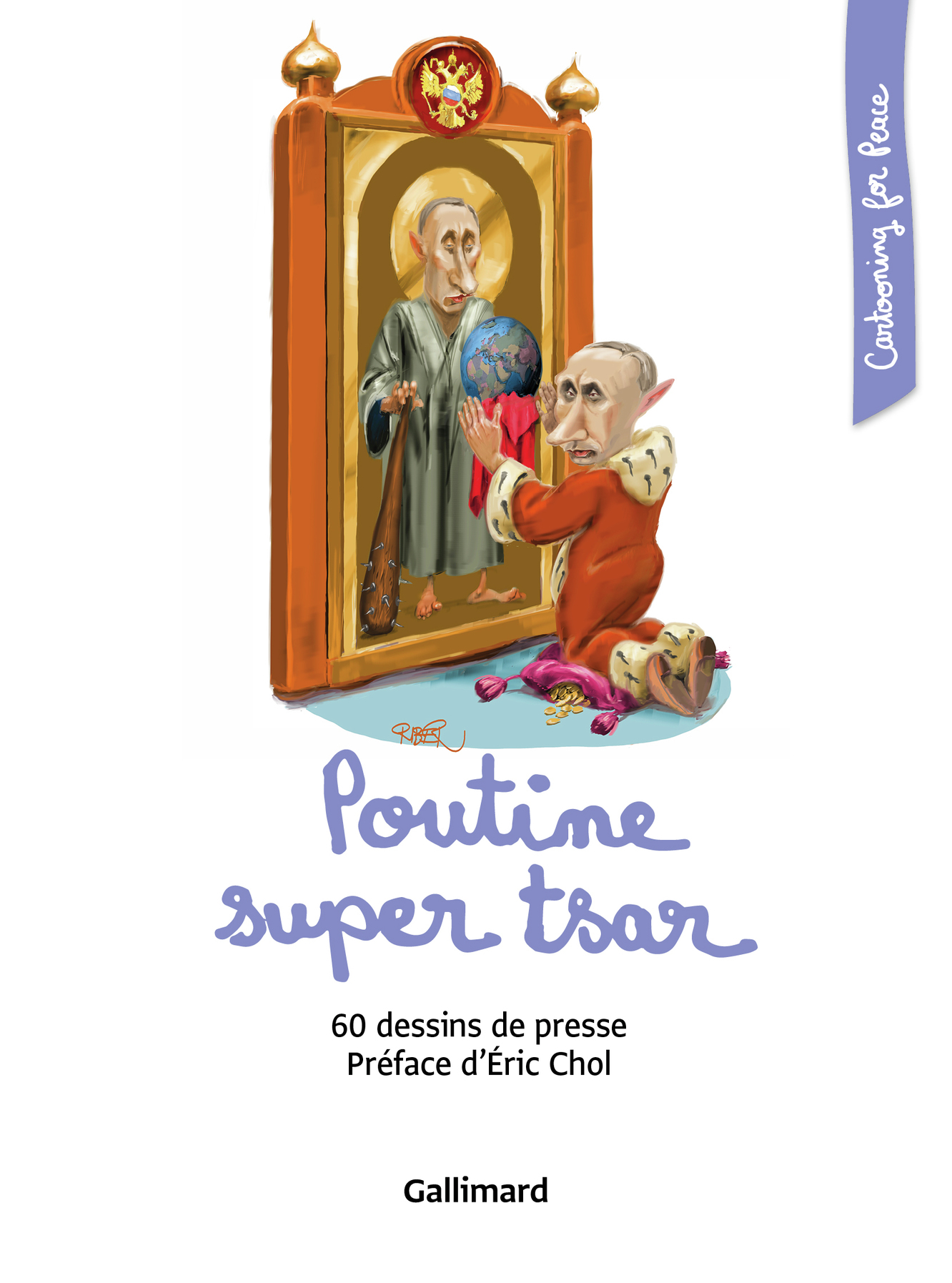
On the eve of Russian elections, retrospective in cartoons on the Putin years
Russian people are going to vote for their new president next March. Vladimir Putin, master of the Kremlin, is leading the country since 2000. How to review the Putin years so far? What would he eventually leave to his successor, if successor there is? A selection of 60 editorial cartoons gives an international point-of-view on his controversial actions, as Russia’s external relations with the rest of the world became more and more tense during the past few years. In his preface, Eric Chol – managing editor of French weekly magazine Courrier international – paints an objective and documented portrait of who can be described as a central character of Russian’s political scene.
Royalties are donated to Cartooning for Peace to support threatened cartoonists.
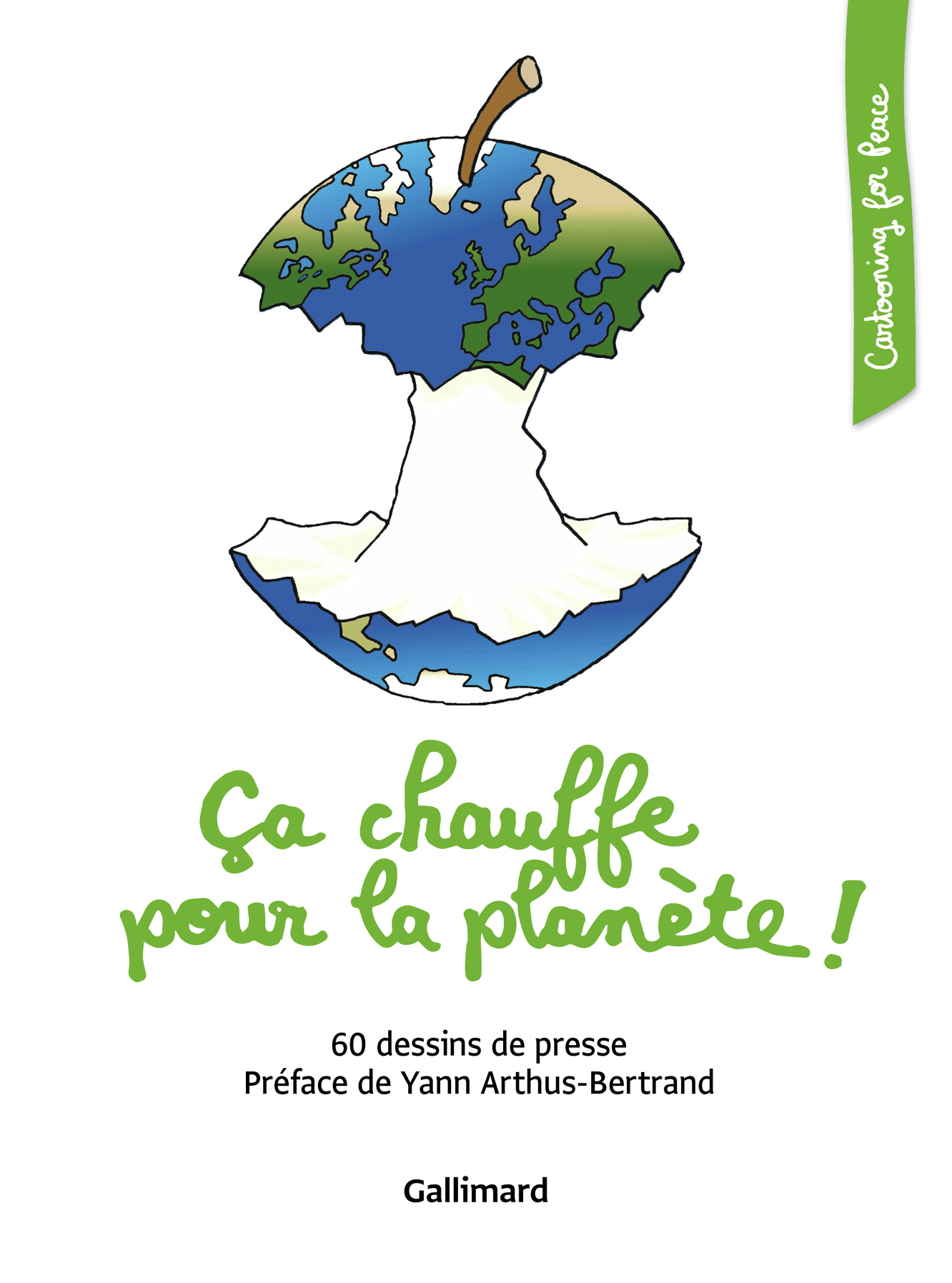
Cartoonists from all over the world raise the alarm on the state and health of our Planet!
Now that the US decided to withdraw from Paris climate agreement and our annual planetary ressources are consumed in less than 8 months, it may be a good time to question the health of our good old Mother Earth. Cartooning for Peace raises awareness about environmental issues through a selection of 60 editorial cartoons from all over the world in a brand-new album. Thematic sections explore challenges of global warming, consequences of natural disasters and renewable energies for example.
The preface was written by Yann Arthus-Bertrand profoundly committed to the environmental cause through his photographic work, the production of documentaries and his foundation’s actions, Good Planet.
Royalties are donated to Cartooning for Peace to support threatened cartoonists.
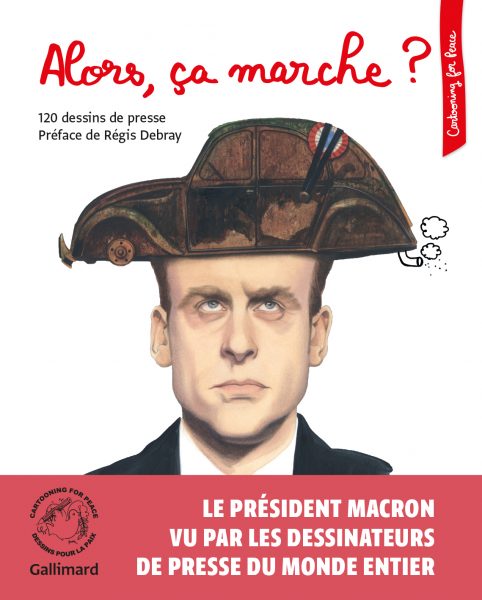
After a chaotic election campaign marked by scandals and the internal division of the two major political parties in the country, French people finally elected last May their new president: Emmanuel Macron. This new political actor’s personality is as much intriguing than a subject to criticism. Who is really Emmanuel Macron? What is his project for France?
Editorial cartoonists from all around the world share their points of view on the new French president in this special-edition, published in Cartooning for Peace and éditions Gallimard collection – available in French bookstores from October 12th 2017.
In this album, writer and philosopher Régis Debray reviews the 100 first days of Emmanuel Macron. A selection of 120 political cartoons complete his commentaries, exploring each step of the mandate’s beginning.
Royalties are donated to Cartooning for Peace to support threatened cartoonists.
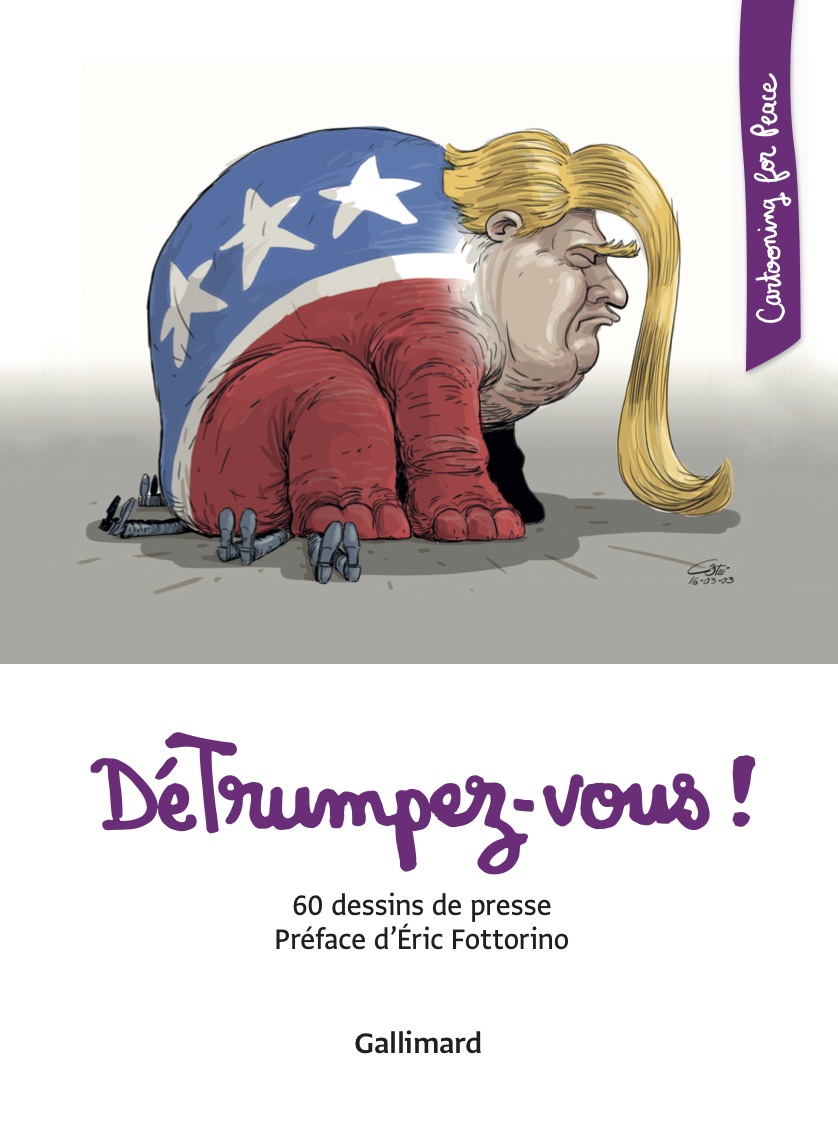
These past few months, the new USA President became one of the major topics for editorial cartoons. In his text, Eric Fottorino looks back on Trump’s election and the sixty cartoon selection gives an international point of view on the 45th President of the United-States.
Eric Fottorino is a journalist and author. After twenty five years working for Le Monde, he is, since 2014, co-creator and publisher of the weekly magazine Le 1. He is also the author of many essays and novels, such as Trois Jours avec Norman Jail (Gallimard, 2016)
Royalties are donated to Cartooning for Peace to support threatened cartoonists.
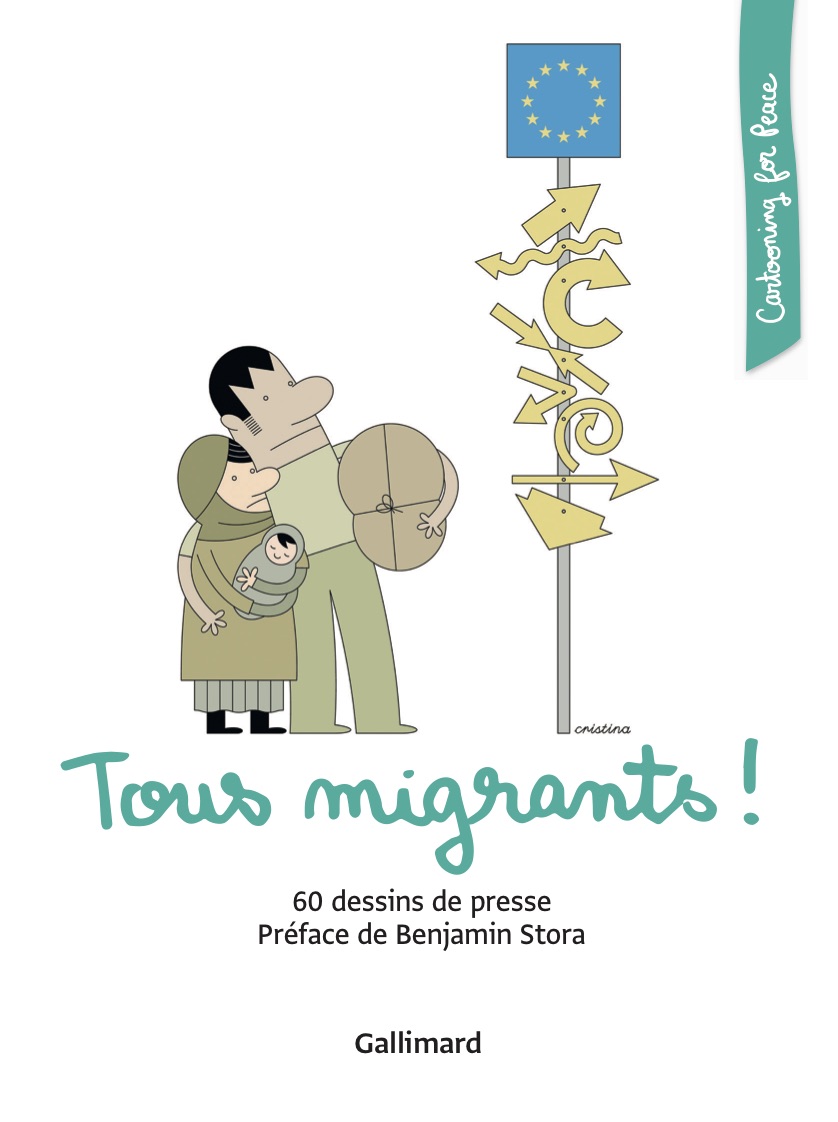
Since 2014, a million and a half migrants have reached the European Union. Benjamin Stora tells of the long journey of these refugees from the reason of their exil to their everyday life in their host countries. The sixty editorial cartoons give an international point of view on this migratory phenomenon which is unprecendeted in modern history.
Benjamin Stora is a university lecturer and board member of the Immigration History Museum (Paris). Specialist of the contemporary history of North Africa, he is the author of many books, such as Histoire dessinée de la guerre d’Algérie (Le Seuil, 2016).
Royalties are donated to Cartooning for Peace to support threatened cartoonists.
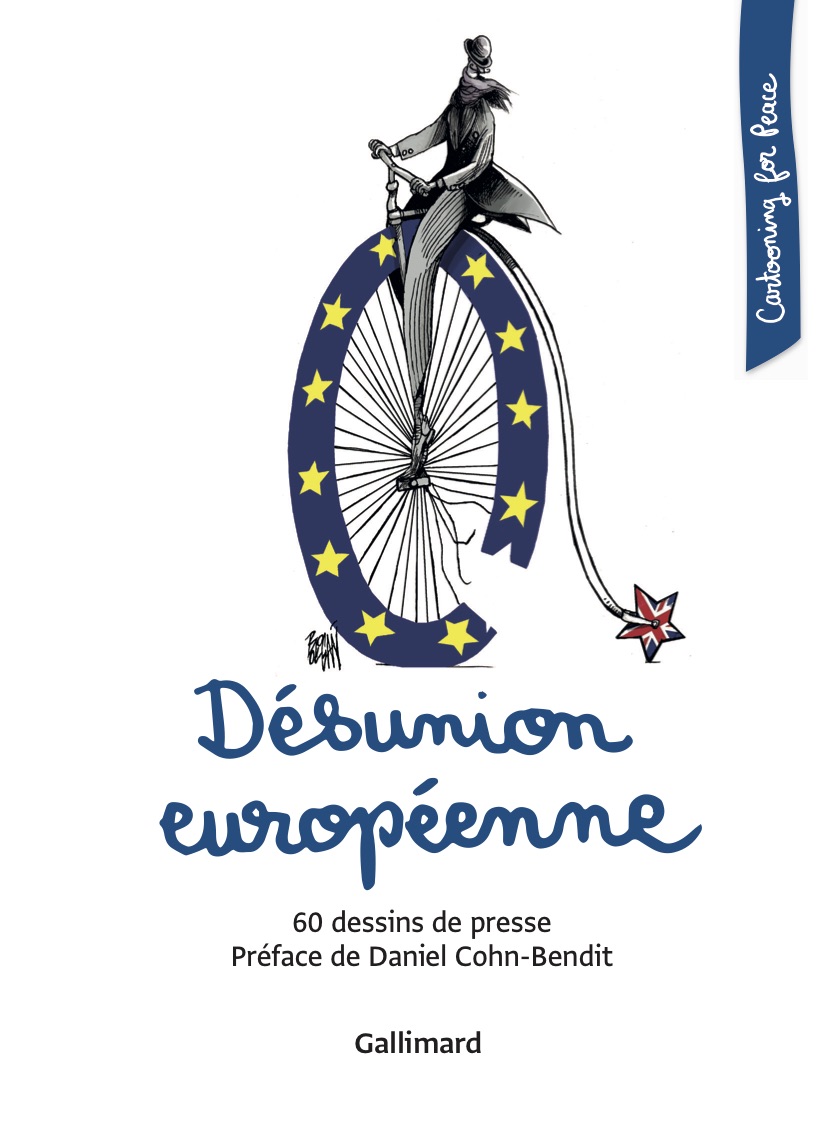
Daniel Cohn-Bendit, staunch europhile, looks back on six decades of European construction. The cartoonists shed an international light on the political, economical and ideological problems which European leaders and citizens face today.
Daniel Cohn-Bendit is a journalist and political leader. He was an MEP from 1994 to 2014 and co-president of the Greens-European Free Alliance group in the European Parliament from 2002 to 2014. He has a daily spot each morning on Europe 1 radio in which he comments on current affairs.
Royalties are donated to Cartooning for Peace to support threatened cartoonists.
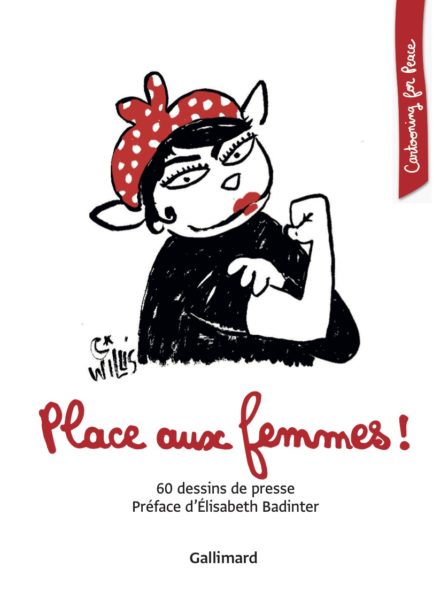
Press cartoonists have often seized on the issue of women to denounce, with humour, the inequalities and injusticies of which women are currently victim all around the world. After the preface wrote by Elisabeth Badinter, elder stateswoman of feminism, a 60 strong selection of cartoons establishes a picture of the many problems that women encounter in terms of education, sexuality, work or religion.
Elisabeth Badinter has a higher degree in philosophy. Specialist of the Age of Enlightment, she pays a particular attention to the evolutions of customs and mindsets. Committed to the feminist cause, she is the author of many books, such as the recent Le Pouvoir au féminin, Marie-Thérèse d’Autriche, 1717-1780 (Flammarion, 2016).
Royalties are donated to Cartooning for Peace to support threatened cartoonists.
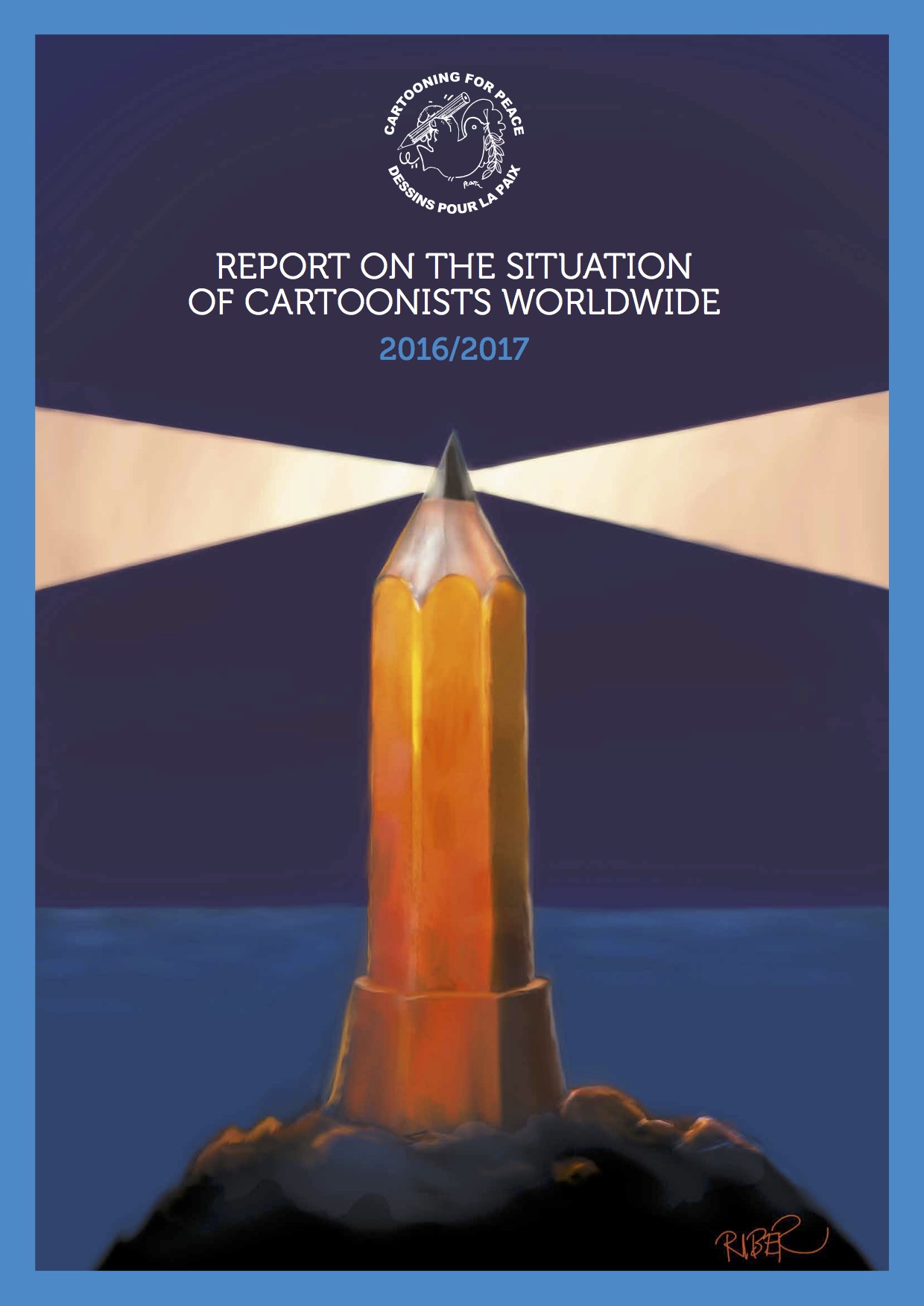
Celebrating World Press Freedom Day, Cartooning for Peace releases its first report on the situation of cartoonists worldwide 2016/2017.Whether their cartoons concern politics, the economy, sports or religion, cartoonists are confronted with the same threats as newspaper, radio and television journalists who cover sensitive subjects.
This report proposes a double approach: a country-based approach to contextualize cartoonists’ relationship to freedom of expression and an angle on emblematic cartoonists cases. This report is based on the information collected by Cartooning for Peace’s watchdog and alert unit and the work of external contributors.
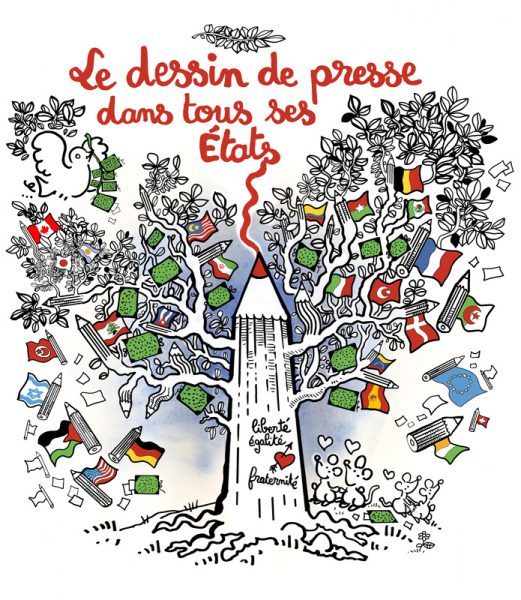
By their very nature of satire and irony, press cartoons evoke many questions: in the name of freedom of expression, shall we tolerate anything and everything? Is it possible to laugh about everything, with everyone? How can we combine freedom, responsibility and tolerance? Inciting a smile, conveying a message, and making people think, the press cartoon is an undeniable tool for dialogue and tolerance.
This is all the work of awareness and education that Cartooning for Peace has been leading for 10 years. Press cartoons: a state of affairs was an international symposium organized by Cartooning for Peace the 21st of September 2015, on the initiative of the philosopher Regis Debray and French cartoonist Plantu. It has gathered cartoonists from of all over the world, but also eminent personalities from the political, the intellectual, the academic and the theological world.
This book brings together the greatest interventions from this entire symposium. It covers many different topics, from cartoons’ history to nowadays issues, such as Internet and secularism.
Gallimard Editions
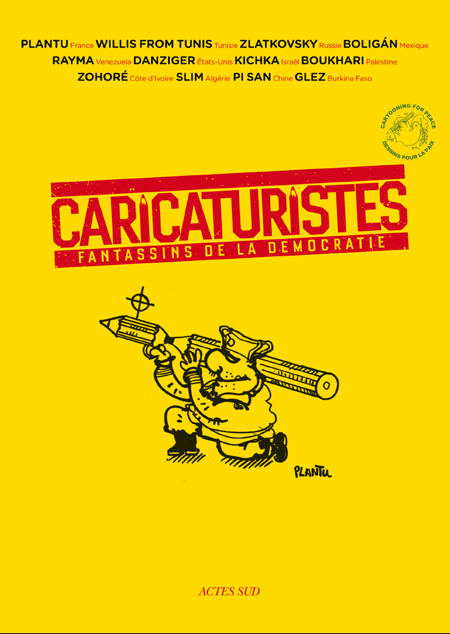
For the release of the film « Caricaturistes – Fantassins de la Démocratie », directed by Stéphanie Valloatto, co-written and produced by Radu Mihaileanu, the Actes Sud Editions published an eponymous book, presenting twelve great international cartoonists, well known for their courage and their commitment to democracy. This book retraces the lives of these 12 footsoldiers of free speech. It highlights their fight, explores their creativity and presents around 300 cartoons.
Available in bookstores on May 28th, 2014
Actes Sud Editions
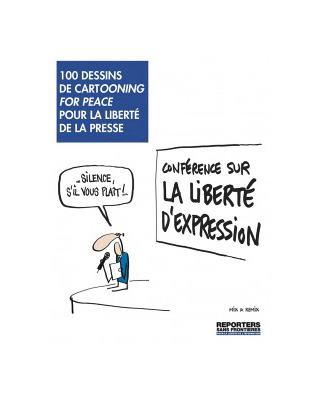
Reporters Without Borders publishes its 44th album: “100 dessins de Cartooning for Peace pour la Liberté de la Presse”!
On the 5th of December 2013, Reporters Without Borders publishes a new album entirely dedicated to cartoons: 100 dessins de Cartooning for Peace pour la Liberté de la Presse. More than 50 editorial cartoonists and journalists around the world contributed to this collectors’ item on freedom of expression, the state of the world and what is now a hot topic: “the world under surveillance.”
Now available in digital version on the Apple Store for 7,99€.
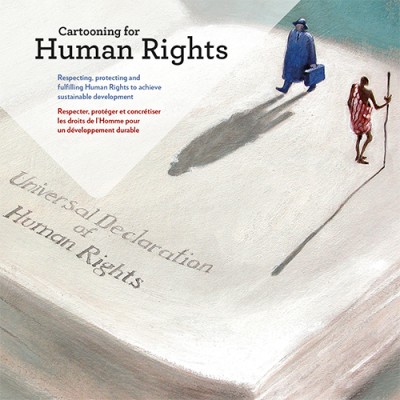
In December 2015, with the support of the European Commission, Cartooning for Peace brings together 28 European cartoonists to discuss human rights inside the European Parliament in Strasbourg. The exhibition “Cartooning for Human Rights” is presented together with this meeting.
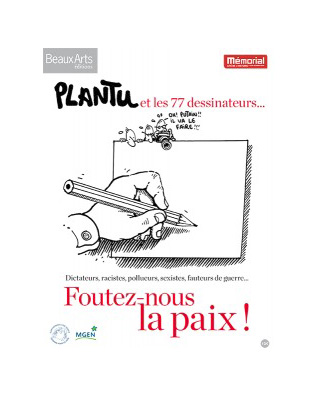
“Plantu and the 77 cartoonists…Dictators, racists, polluters, sexists, warmongers… Leave us alone!”
“This could be the cartoonists from all over the world cry. They are too often harassed by fundamentalists and intolerance of all kinds, rejected by politicians who only appreciate cartoons when they attack the opposing party and supervised too strictly by editors.”
Since 2010, the Caen Memorial holds a permanent exhibition imagined by Plantu with the worldwide editorial cartoonists association “Cartooning for Peace”. The album from the Editions Beaux Arts contains a selection of major cartoons which tackle abuses of power, religions, soldiers, financier, etc.
Beaux-Arts Editions
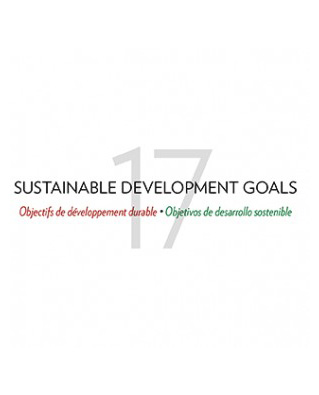
The catalogue of the exhibition 17 objectifs pour le développement durable en dessins de presse is published on the occasion of the participation of Cartooning for Peace in the European Development Days, on the 3rd and 4th of June 2015 in Brussels.
Each year, the European Development Days gather about 5000 participants coming from more than 140 countries and representing 1200 organisations from development, cooperation, human rights and humanitarian aid sectors.
Cartooning for Peace joins this great event by displaying an exhibition made of editorial cartoons that depict the 17 sustainable development objectives of the new Millennium Goals.
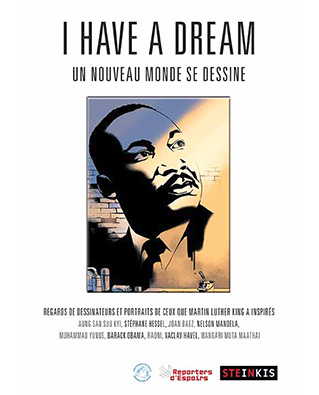
“I have a dream – Un nouveau monde se dessine” was published by Steinkis editions in August 2013, in collaboration with Cartooning for Peace. This collective book pays tribute to Martin Luther King on the occasion of the 50th anniversary of his famous speech.
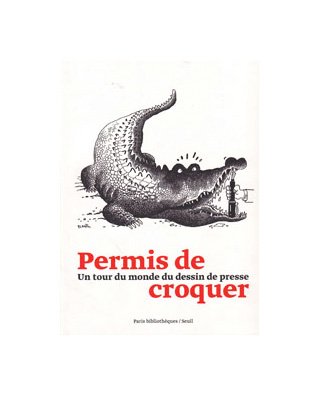
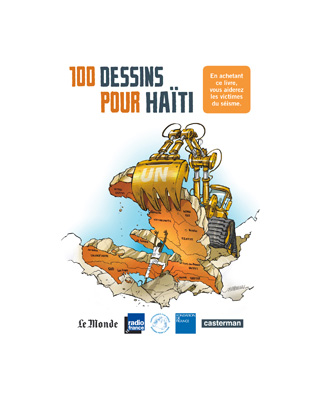
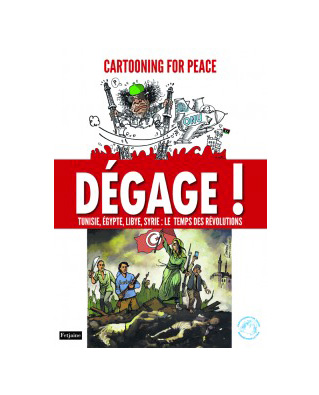
December 2010. Mohamed Bouazizi, young Tunisian of 26 years old, set himself on fire in Sidi Bouzid, Tunisia. This desperate act is the start of protest movements that spread through Arab world in 2011 ; revolutions against dictatorships also known as the Arab Spring.
Drawing is always the expression of a revolt, most of the time the expression of population’s revolt. The “DÉGAGE !” book compiles sketches on unprecedented revolutions in the Arab world in 2011.
Fetjaine Editions